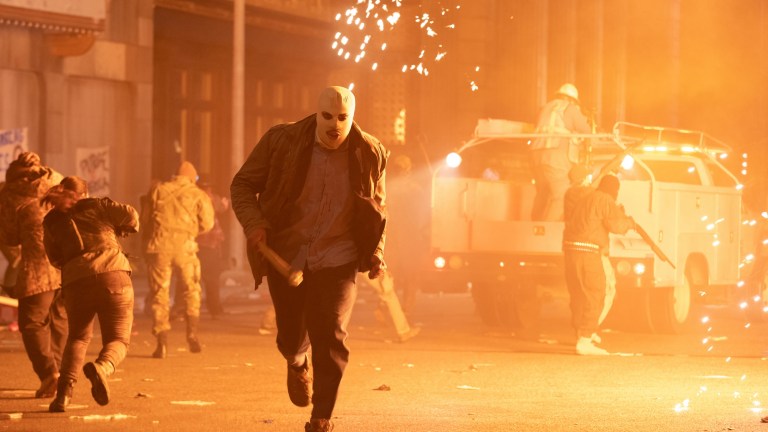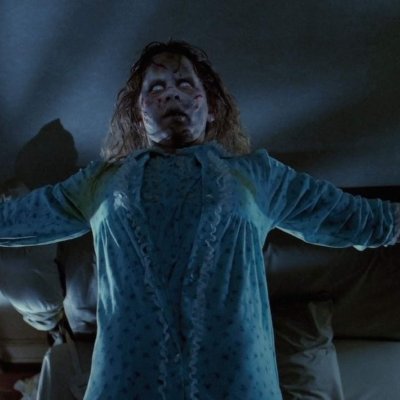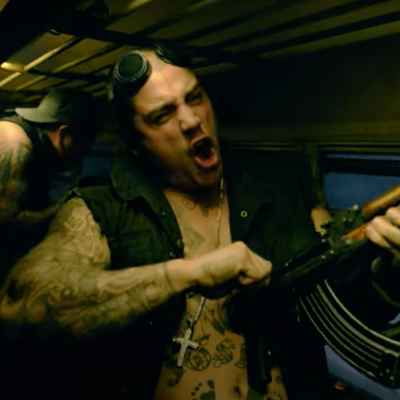The Forever Purge Review: Insurrectionists in Horror Movie Makeup
The Forever Purge is as blunt as the other films in the Blumhouse franchise, but is looking more like a documentary than ever before.

Movies typically take several years to get in front of an audience, from the screenwriter first putting words on the page to the finished film unspooling in a dark theater (or, these days, streaming on your tablet). So there’s always a weird double-take when a movie like The Forever Purge comes out and it seems to eerily capture or mirror events unfolding in real-life as they’re happening.
Such has been the case with the series of movies collectively known as The Purge, which in many ways have never outgrown their original recipe as a hard, violent shell of low-budget action/horror wrapped around a viscous, somewhat self-contradictory center of socially conscious speculative fiction.
Yet whatever flaws one may find in the now five films in the series (we have not watched the two-season TV show, so we won’t bring it into this discussion), the vision behind the narrative—primarily that of creator James DeMonaco, who has written all five pictures and directed three of them—has remained remarkably consistent, often frightening, and right on the nose when it comes to the news.
The Forever Purge may be the most terrifying of the films yet. Its central idea about an overnight, 12-hour bacchanal of hate in which all crime, including murder, is legal gets turned on its head this time out: The monstrous creation of the totalitarian regime in power bites down hard on the hand that has fed it for years as the revelers decide that they’re taking power into their hands well past the 12-hour curfew.
As The Forever Purge opens, the New Founding Fathers of America (NFFA) have wrested power back again—no doubt through gerrymandering and voter suppression—after actually losing to Sen. Hillary Clinton Charlene Roan in 2016’s The Purge: Election Year. That entry had the real-life scenario more or less right but missed the outcome by a country mile (2018’s The First Purge, the first of the films not directed by DeMonaco, was a vacuous origin story set before the rest of the series).
With the NFFA back in the saddle in Washington, they immediately reinstitute the Purge, which serves less as an escape valve for the country’s anger issues than as a means for the NFFA to get rid of the impoverished and disenfranchised—the people the government is supposed to help—by setting them against each other.
As the nation prepares for another Purge, our new movie turns to two central family units. The first is a Mexican couple named Adela (Ana de la Reguera) and Juan (Tenoch Huerta), who escaped a vendetta held by their homeland’s drug cartels some time back and now live industriously and quietly in Texas, where Juan and his friend T.T. (Alejandro Edda) work on the ranch of the wealthy Tucker clan.
Tucker patriarch Caleb (Will Patton) is old school if decent enough, treats his workers well, and is impressed with Juan’s skills as a cowboy. But that only pisses off Caleb’s son Dylan (Josh Lucas), who doesn’t consider himself racist (do they ever?) but believes that folks should stay with their own kind. Which is kind of what happens as the Tuckers—including Josh’s pregnant wife Emma (Cassidy Freeman) and more liberal-minded sister Harper (Leven Rambin)—lock down their mansion while Juan, Adela and T.T. must spend Purge Night in a local shelter.
Once the sun rises and the Purge is over, however, the real horror begins: a large, loosely organized underground movement, fueled primarily by their hatred of everyone from immigrants to the rich, to anyone they don’t consider real Americans, decides that 12 hours isn’t enough: the Purge is going to continue until the nation is cleansed, even if it means bringing down the NFFA as well.
From that point on, The Forever Purge turns mostly toward bloody action as the Tuckers must join forces with Adela, Juan, and T.T. in order to reach the border in El Paso, which has all too ironically been opened for a limited time to let as many Americans as possible escape the carnage and chaos consuming the nation as a shocked world watches.
The scenes of the Forever Purgers taking matters into their own hands and escaping the grip of the government that has essentially nurtured their violent growth hit very close to the bone in light of what happened in this country on Jan. 6 when a mob of ignorant traitors, their dull minds poisoned by the lies of the disgraced grifter then occupying the White House, made a violent attempt to stop the peaceful transfer of power for the first time in our history.
By all accounts, the enablers of the impeached president and the leaders of his political party who looked the other way with his every transgression were just as shocked as the rest of the nation at what transpired, even though their own rhetoric and behavior going back to the 1990s had cultivated it. The same thing happens in The Forever Purge: although we never see the reactions of the NFFA leaders to the Forever Purgers. Still, we get the impression that they’re just as terrified as the people on the street.
No one is ever going to accuse this franchise of subtlety, and there’s little in evidence in this movie. But it’s downright unsettling how The Forever Purge remarkably parallels real life to some degree, giving a gravitas to the film’s proceedings that they may or may not deserve (keep in mind that filming wrapped in February 2020, nearly a full year before the Jan. 6 insurrection).
Although the action in the film has expanded greatly from the previous entries, it’s still relatively contained, which has its pros and cons. While that relegates the bigger story to mostly exposition heard on radio broadcasts and so forth, denying the movie the full scope it might need, it also forces DeMonaco and new franchise director Everardo Valerio Gout to focus on the main characters.
But with the exception of Juan and Adela, the rest of the characters, as with the other movies, are mostly rudimentary sketches. Lucas and Patton try to bring some nuance to the rich white men they play, but the Tucker womenfolk are even less defined. And even Juan and Adela sometimes seem too saintly, too empathetic, to be true, even as our sympathies lie with them throughout the film.
Gout directs the action well enough, and there are some scenes of genuine menace as our heroes find themselves caught in the crossfire of the burgeoning civil war between the U.S. military and the Forever Purgers. Yet the escape to the border plays out as rather rote, even with the wider implications of what’s happening in the background to give it weight.
We won’t tell you how The Forever Purge ends, but it does take the series in a new direction that could serve as either a finale or the gateway to a continuation of the storyline. And we can also tell you that even with its occasionally by-the-numbers feel, stock characterizations, and sometimes uneven pacing, we found The Forever Purge to be gripping, chilling and darkly satisfying—even as it brought back a memory we have no desire to live through again.
The Forever Purge is out in theaters this Friday, July 2.


